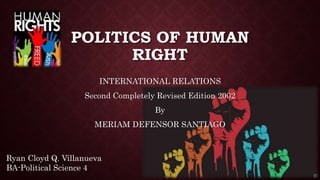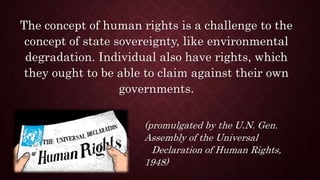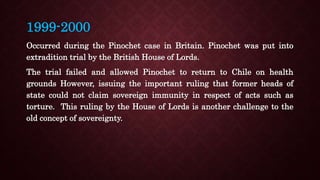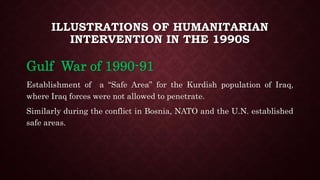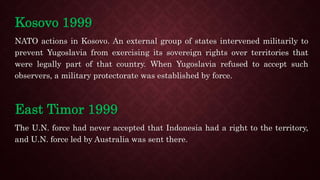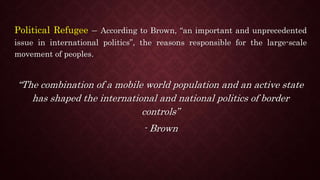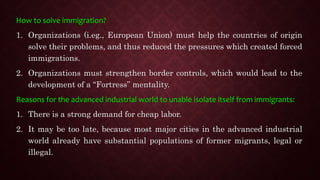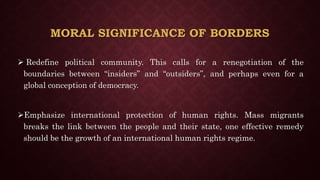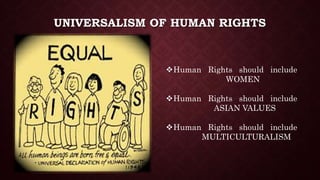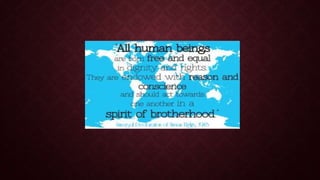Politics of Human Right
- 1. POLITICS OF HUMAN RIGHT INTERNATIONAL RELATIONS Second Completely Revised Edition 2002 By MERIAM DEFENSOR SANTIAGO Ryan Cloyd Q. Villanueva BA-Political Science 4
- 2. The concept of human rights is a challenge to the concept of state sovereignty, like environmental degradation. Individual also have rights, which they ought to be able to claim against their own governments. (promulgated by the U.N. Gen. Assembly of the Universal Declaration of Human Rights, 1948)
- 3. SUBSEQUENT DEVELOPMENTS IN THE INTERNATIONAL HUMAN RIGHTS REGIME 1990s As the Cold War ended in 1989 the adherence of the West to human rights has been continually placed to the test, raising new issues. A new issue on the question of legal remedies for human rights violations. International war crimes tribunals was created to deal with offenses committed during the wars of former Yugoslavia and the genocide in Rwanda.
- 4. 1999 Establishment of the International Criminal Court through a signing of treaty. However, U.S. opposes because on the ground that U.S. armed forces will be the subject of politically motivated prosecutions. The treaty is expected to take effect in 2003 thus, the power of the court are limited. Prosecutions are controlled by the U.N. Security Council. The very concept of the international criminal court is already a genuine departure from the past.
- 5. 1999-2000 Occurred during the Pinochet case in Britain. Pinochet was put into extradition trial by the British House of Lords. The trial failed and allowed Pinochet to return to Chile on health grounds However, issuing the important ruling that former heads of state could not claim sovereign immunity in respect of acts such as torture. This ruling by the House of Lords is another challenge to the old concept of sovereignty.
- 6. DOCTRINE OF HUMANITARIAN INTERVENTION According to Brown, the Doctrine of Humanitarian Intervention, as the embryonic doctrine, is the most significant legal change in the concept of sovereignty posed by human rights doctrine. As defined, it is “the intervention (perhaps forcibly) of one state, or group of states, in the internal affairs of another, conducted mainly, or substantially, in the interest of the inhabitants of the latter”. The doctrine goes to the heart of the issue in the international protection of human rights. It is a direct challenge to the U.N. Charter which explicitly forbids intervention in the domestic jurisdiction of states.
- 7. ILLUSTRATIONS OF HUMANITARIAN INTERVENTION IN THE 1990S Gulf War of 1990-91 Establishment of a “Safe Area” for the Kurdish population of Iraq, where Iraq forces were not allowed to penetrate. Similarly during the conflict in Bosnia, NATO and the U.N. established safe areas.
- 8. Kosovo 1999 NATO actions in Kosovo. An external group of states intervened militarily to prevent Yugoslavia from exercising its sovereign rights over territories that were legally part of that country. When Yugoslavia refused to accept such observers, a military protectorate was established by force. East Timor 1999 The U.N. force had never accepted that Indonesia had a right to the territory, and U.N. force led by Australia was sent there.
- 9. MASS MOVEMENTS ACROSS NATIONAL BORDERS One human rights issue that challenges the concept of state sovereignty is the mass movements of people across national borders, exemplified by migrants, refugees, and asylum seekers. The emergence of a global economy, and a global market for labor in a world characterized by extreme international economic inequality, have all made mobility the buzzword of our time. Push Factor Pull Factor Migrant workers are not only attracted by higher wages in other countries, but also by societies that are democratic than the government regimes they leave behind. POVERTY LABOR SHORTAGES MIGRANT WORKER S
- 10. Political Refugee – According to Brown, “an important and unprecedented issue in international politics”, the reasons responsible for the large-scale movement of peoples. “The combination of a mobile world population and an active state has shaped the international and national politics of border controls” - Brown
- 11. “IMMIGRANTS” NATIONALISTS SOCIAL DEMOCRATS LIBERALS REVOLUTIONAY SOCIALISTS The two phenomena of mass movements across borders, and of environmental politics, indicate that the current political institutions are inadequate to deal with such realities. However, the two phenomena have one significant difference. Environmental degradation affects everyone, and therefore everyone must adapt. By contrast, population movements are limited to those countries which are forced to receive the migrants, whom they can send away.
- 12. How to solve immigration? 1. Organizations (i.eg., European Union) must help the countries of origin solve their problems, and thus reduced the pressures which created forced immigrations. 2. Organizations must strengthen border controls, which would lead to the development of a “Fortress” mentality. Reasons for the advanced industrial world to unable isolate itself from immigrants: 1. There is a strong demand for cheap labor. 2. It may be too late, because most major cities in the advanced industrial world already have substantial populations of former migrants, legal or illegal.
- 13. MORAL SIGNIFICANCE OF BORDERS Redefine political community. This calls for a renegotiation of the boundaries between “insiders” and “outsiders”, and perhaps even for a global conception of democracy. Emphasize international protection of human rights. Mass migrants breaks the link between the people and their state, one effective remedy should be the growth of an international human rights regime.
- 14. UNIVERSALISM OF HUMAN RIGHTS Human Rights should include WOMEN Human Rights should include ASIAN VALUES Human Rights should include MULTICULTURALISM

